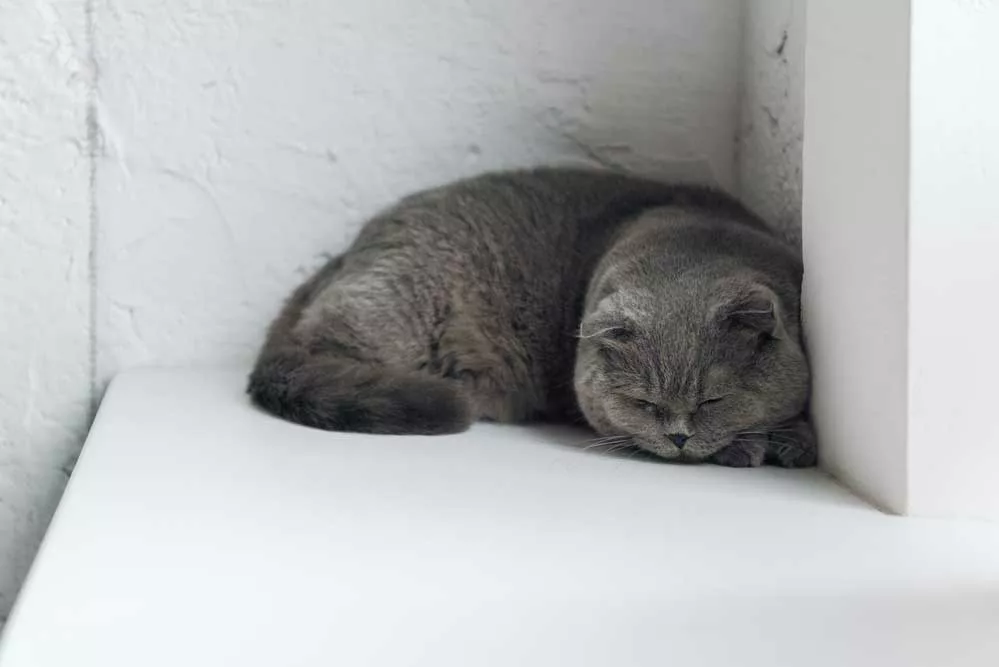If you own a cat, you may know that cats can develop conditions similar to humans, such as diabetes and asthma. It’s not clear whether cats can develop autism, a disorder that affects communication and social interaction. If you struggle to find answers to the question, can cats be autistic? You’re in the right place.
Read along as we divulge the relationship between cats and autism and discuss the current research on this topic. We will also address some common questions and concerns cat owners have raised about this topic.
Table of Contents
- Autism: What is it?
- Can Cats Be Autistic?
- What Cat Behaviors Are Similar to Those of Autism?
- Do cats have other mental illnesses?
- Cats, Children, and Autism
- Conclusion
Autism: What is it?
Autism is a neurodevelopmental disorder that affects communication and social interaction. Its symptoms can range from mild to severe and vary from person to person.

(kitten closing eyes)
Can Cats Be Autistic?
Various reasons may cause cats to exhibit signs that mirror people who have autism. To mention a few, they include:
- Poor nutrition
- Infectious diseases
- Physiological abnormalities
It’s important to note that cats may exhibit signs like typical autism, but it’s almost impossible to test cats for autism.

(A cat sitting alone on the couch)
What Cat Behaviors Are Similar to Those of Autism?
Many symptoms that indicate autism in humans are also exhibited in cats. They may include changes in social interaction, vocalization patterns, and unusual levels of focus.

(Sleeping cat)
Lack of Social Interaction
Many cat breeds are naturally independent and require to be alone in most instances. It’s normal for cats to show disinterest in people or other animals. However, if a cat displays antisocial behavior towards others, it’s likely due to its overall temperament.
The level of socialization of a cat during its development stage can affect its social behavior as an adult. Kittens that receive more socialization with humans tend to be friendlier and more social as they mature.
Vocalization
Vocalization is one of the most obvious signs of autism in humans and cats. When your cat purrs, chirps, and meows when around you, it doesn’t mean it has autism.
Some cat breeds are more talkative than others, and it’s normal for cats to vary their vocalization patterns. Unless the vocalization results from distress, don’t conclude that something is wrong.

(Striped kitten)
Extraordinary Intelligence
Many cat breeds, such as Birman cats and Abyssinians, are known for their intelligence. It’s normal for cats to be unpredictable and to have varying levels of interest in different objects or activities. If a cat exhibits a particularly intense focus on a particular toy or object, it means that it enjoys that specific activity or item. It’s not a sign of autism.
Fascination with Lights and Movement
One behavior similar to those seen in people with autism is a fascination with lights and movement. This type of behavior is often referred to as stimming, which stands for self-stimulatory behavior. Stimming can serve as a way for people with autism to regulate their senses and emotions.

(gray and white kitten)
Sensory Abnormalities
Cats may also exhibit sensory abnormalities, such as oversensitive to specific sounds. For example, a cat may become agitated or distressed by loud noises or avoid certain surfaces or textures.
On the other hand, a cat may not react to stimuli perceived as painful or unpleasant, such as being stepped on or pinched. It’s important to note that sensory abnormalities don’t indicate that a cat has autism.
Strong Preferences
People with autism may exhibit strong preferences for certain routines. Cats may also show strong preferences and become distressed when their routines get disrupted. For example, a cat may become agitated if its food or water dish gets moved to a different location.

(The cat and the water dish)
Do cats have other mental illnesses?
It’s not uncommon for people to wonder if their cats can also experience mental health conditions. Let’s divulge some common mental disorders in cats.
Obsessive-Compulsive Disorder
Some animal behavior specialists may observe behaviors in cats similar to those in people with OCD. For example, a cat may exhibit repetitive behaviors, such as excessive grooming or becoming too fixated on a specific object or activity.

(two kittens sitting)
Feline Cognitive Dysfunction
FCD is a condition that affects older cats and causes changes in cognitive function. If a cat exhibits symptoms of feline cognitive dysfunction, it’s important to consult a veterinarian.
Feline Hyperesthesia Syndrome
FHS is a condition that affects cats and causes abnormal skin sensitivity and abnormal behaviors in cats. Stress, changes in the cat’s environment, or certain medical conditions trigger FHS.
Anxiety
Signs of anxiety in cats can include excessive grooming, scratching, and avoidance of particular objects. However, these signs can also show when a cat experiences other health problems.

(A cat resting alone)
Cats, Children, and Autism
Some research suggests that cats can be beneficial companions for children with ASD. Cats may provide stable, non-judgmental companionship and may help with social isolation. The best bonds occur when cats are adopted as kittens, and the primary interaction is hugging.
Affectionate cats have low aggression and are socially outgoing. It’s important to consider the needs and preferences of the child and the cat and to work with a veterinarian or animal behaviorist if necessary.

(A bunch of cute cats)
Conclusion
In a nutshell, we have seen that cats may exhibit behaviors like those of people with autism, but it’s unlikely they have autism. Other factors, such as poor nutrition, and physiological abnormalities, may cause these behaviors.
A lack of social interaction, unusual vocalization, or fascination with lights and movement doesn’t mean that a cat has autism. If you’re concerned about your cat’s behavior, consult a veterinarian to determine the cause.
